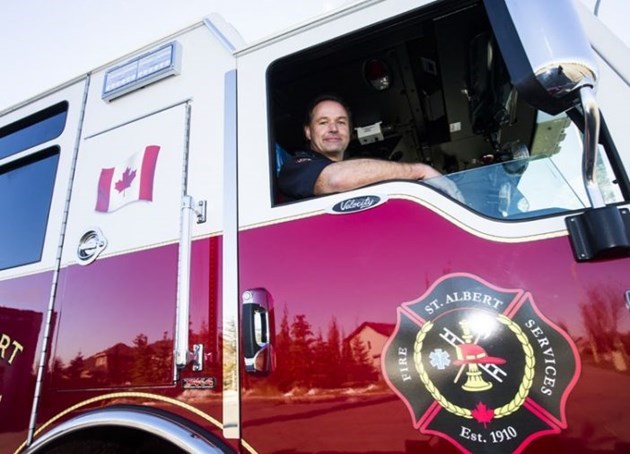St. Albert fire chief Bernd Gretzinger issued an apology a week ago for dressing up in blackface. This week, a photo of the incident surfaced.
Gretzinger, who has been suspended without pay for two weeks, told the Gazette he was sorry for his actions.
“I apologize and didn’t mean to hurt anybody,” Gretzinger said.
Three years ago, Gretzinger was invited to a party where everybody dressed up as their favourite musician. Gretzinger, who idolizes Lenny Kravitz, dressed up as the rock and roll legend while wearing blackface. He says he did not realize it was inappropriate at the time.
Gretzinger said he removed a photo of the incident from Facebook around a year ago as he came to the gradual realization that it was inappropriate.
“I started looking at it and realized it was inappropriate for me to have a picture like that,” Gretzinger said.
“We are at a place where it’s definitely not acceptable.”
On Sept. 19 of this year, Gretzinger posted on his Facebook page an apology for the photo.
“I just wanted to make sure everybody was clear about where I stood and where my heart was with this. It's just a lot easier to hide and not say anything and let things fade away. I just felt if I stated that and was honest about it, then people would know,” Gretzinger said.
"I felt was the right thing to do."
The fire chief said he hopes his experience will bring the issue to the forefront so the community can talk about it and learn from it.
In the Facebook post, Gretzinger explained to his friends that he had dressed up as Kravitz but had removed the photo from his Facebook page a year prior.
“I now realize this is black face and racially insensitive and despite my intent at the time must identify it wasn’t appropriate and shouldn’t have done it. I assure everyone it will never happen again. For anyone reading this that was offended by my actions please accept my sincere apology,” the post read.
Gretzinger said he has spent his 33-year career building bridges and bringing people together.
"Having a picture like that doesn't build bridges, it just tears them apart," Gretzinger said.
Following news reports about the photo, St. Albert chief administrative officer Kevin Scoble issued a statement calling the actions "racially insensitive and not consistent with the culture of the City of St Albert (COSA) and the values we hold."
Scoble stated Gretzinger, who is not named in the statement, has taken accountability and is making amends, "a positive step moving forward."
Scoble stated the city is using this situation to educate staff on the importance of self-reflection, and has asked staff to reflect on city culture and values as well.
The city declined a request for an interview with Scoble.
St. Albert’s only councillor of colour, Ray Watkins, read a statement on the issue to the Gazette.
“I have known Bernd for a little over two years. During that time I have found him to be thoughtful, considerate and professional. Based on my interactions with Bernd, it is my opinion that although his actions may have shown a lack of judgement and understanding, they were not done with hate or malice intended,” Watkins said.
History of blackface
Sourayan Mookerjea, a professor at the University of Alberta who focuses on theory and cultural studies, said blackface routines and comedy skits first emerged in the United States in the 1830s but gained popularity after slavery was abolished, when freed slaves began competing with propertyless white people in the labour market.
“Blackface performances used (to), and still do, stereotype black characters which depict black people as simple-minded, foolish and especially as born to serve whites, caricaturing Black musical and dance traditions. As a theatrical tradition, Blackface performances were one major way of teaching people how to be white supremacists at a time when wealthy property owners feared a political alliance between freed slaves and poor, propertyless whites, especially because of the hardships resulting from the Civil War," Mookerjea said.
Mookerjea said racism has changed in many ways in North America since then but it has not gone away. After the decolonization movement in Asia and Africa, the civil rights movement in the United States and when the world learned of the horrors of the Holocaust, Mookerjea said a new set of taboos emerged in North America through the 1950s and 1960s.
“For educated, modern, liberal people, it was no longer acceptable to act in public like a plantation slave owner or a Nazi. In other words, this is one of the things that any citizen of Canada is now expected to know and understand, somewhat like our legal system expects us to know the law,” Mookerjea said.




